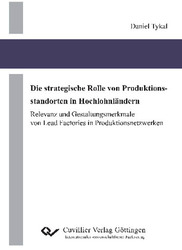| Fachbereiche | |
|---|---|
| Buchreihen (97) |
1381
|
| Nachhaltigkeit |
3
|
| Gesundheitswesen |
1
|
| Geisteswissenschaften |
2370
|
| Medienwissenschaften | 16 |
| Theologie | 57 |
| Philosophie | 102 |
| Rechtswissenschaft | 423 |
| Wirtschaftswissenschaften | 852 |
| Sozialwissenschaften | 417 |
| Sportwissenschaften | 48 |
| Psychologie | 233 |
| Pädagogik | 190 |
| Geschichtswissenschaften | 183 |
| Kunstwissenschaften | 111 |
| Kulturwissenschaften | 166 |
| Literaturwissenschaften | 117 |
| Sprachwissenschaften | 88 |
| Naturwissenschaften |
5407
|
| Ingenieurwissenschaften |
1798
|
| Allgemein |
98
|
|
Leitlinien Unfallchirurgie
5. Auflage bestellen |
|
Erweiterte Suche
Die strategische Rolle von Produktionsstandorten in Hochlohnländern
Relevanz und Gestaltungsmerkmale von Lead Factories in Produktionsnetzwerken
Daniel Tykal (Autor)Vorschau
Inhaltsverzeichnis, Datei (140 KB)
Leseprobe, Datei (210 KB)
The topic of this thesis is the role of a lead factory with emphasis on its configuration
and co-ordination aspects. The basis for this dissertation was established by benchmarking
33 companies. During this project the main focus was on the relevance of
lead factories in high-wage countries.
The global and dynamic business environment requires many companies to pursue
hybrid strategies that balance efficiency, global innovation and local responsiveness.
The allocation of roles among the sites is expected to enhance the leveraging and
building of competences within the manufacturing network.
A literature review shows that a wide range of scientists from different disciplines
have made a significant contribution to our understanding of site roles. An analysis of
all typologies shows that nearly every typology includes a role that equals the definition
of the lead factory. However, not a single framework presents a concrete description
of configuration and co-ordination elements. In this thesis a model of a lead factory
approach is deduced from existing role typologies and from a consideration of resourced-
based aspects of multinational companies. This model reflects the strategic
function of production as well as the multidimensional target-setting of the company.
The practical contribution lies in the development of applicable configuration and coordination
aspects that support companies in making the most of their manufacturing
capabilities. Using the framework, the strategic relevance of manufacturing sites in
high-wage countries becomes visible.
The theoretical contribution lies in the conceptualization of a general framework of
lead factories that integrates several factories and functions and reflects different aspects
of Strategic Management.
| ISBN-13 (Printausgabe) | 386955021X |
| ISBN-13 (Printausgabe) | 9783869550213 |
| ISBN-13 (E-Book) | 9783736930216 |
| Buchendformat | A5 |
| Sprache | Deutsch |
| Seitenanzahl | 220 |
| Auflage | 1 Aufl. |
| Band | 0 |
| Erscheinungsort | Göttingen |
| Promotionsort | Universität St. Gallen |
| Erscheinungsdatum | 06.07.2009 |
| Allgemeine Einordnung | Dissertation |
| Fachbereiche |
Wirtschaftswissenschaften
|








